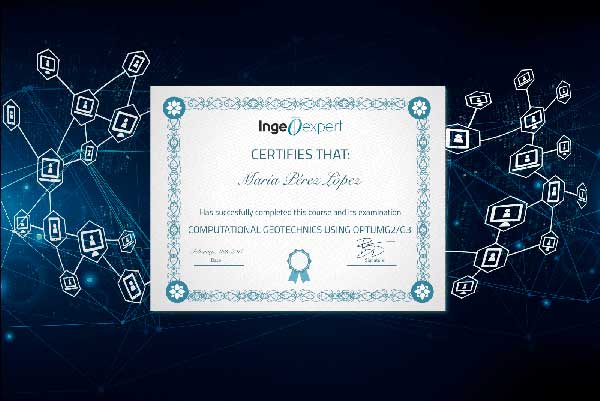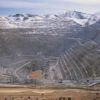Introduction
This course is designed for those students who want to learn more about how minerals will drive the green energy economy of the future. Without minerals we would have no batteries, or wind turbines, or ships, or any kind of high-tech commodities.
But how minerals occur in nature, how their physical and chemical properties are valued commercially, and even how we efficiently extract them, is information not readily available in one place. This course is therefore a unique combination of geology, mineralogy, mineral processing, geometallurgy and material recycling.
The course comprises two introductory modules (Modules 1-2), followed by 4 more in-depth studies (Modules 3-6), with a closing summary module (Module 7), as follows:
MODULE 1.0
Back-to-Basics – The Science of minerals
MODULE 2.0
Mineralogy in everyday life – Applied Mineralogy
MODULE 3.0
Characterization methods for minerals – Imaging, Analysis & Quantification
MODULE 4.0
Mining minerals – Process mineralogy
MODULE 5.0
Green energy minerals – Battery minerals, and metals for wind turbines & solar panels
MODULE 6.0
Circular Economy of minerals – Recycling, remining, & zero-waste concepts
MODULE 7.0
A career in minerals – Opportunities for mineralogists
Objectives
By the end of the course, students will achieve a solid grounding in what is important when it comes to minerals and their commercial importance. They will learn about the following:
- What techniques are used to image and analyse minerals and ores
- Become familiar with basic mineral processing techniques
- Be exposed to advanced process mineralogy case studies where the minerals have been efficiently and effectively separated into saleable products for further use in the value chain
- Learn which minerals will drive the battery revolution of the future
- Understand the complexities of the circular economy of minerals and materials
- And finally get insights into how a knowledge of minerals can lead to new employment opportunities.
Contents
Minerals for the Modern World
MODULE 1.0
Back-to-Basics – The Science of minerals
- – Mineral Evolution Theory
- – Modern classifications (Dana classification in to the 8 basic groups)
- – Basic concepts (crystallography, solid solution, crystallisation, polymorphism, isomorphism, texture, …)
- – Commercial mineralogy
- – Basic Ore deposit classification
- – The value of mineralogy to the world economy
MODULE 2.0
Mineralogy in everyday life – Applied Mineralogy
- – Which minerals are useful and why?
- – Example: Minerals in the home
MODULE 3.0
Characterization methods for minerals – Imaging, Analysis & Quantification
- – Optical
- – E-beam
- – X-ray beam
- – Laser beam
- ….
MODULE 4.0
Mining minerals – Process mineralogy
- – Mineral processing basics
- – Concept of comminution and liberation
- – Menace minerals
- – Peak mineral concept
- – Geometallurgy
- – Case studies
MODULE 5.0
Green energy minerals – Battery minerals, and materials for wind turbines & solar panels
- – Graphite
- – Nickel
- – Cobalt
- – REE’s
- …….
MODULE 6.0
Circular Economy of minerals – Recycling, remining, & zero-waste concepts
- – Recycling mineral-based products
- – Remining old mine sites
- – Nothing-wasted practices
MODULE 7.0
A career in minerals – Opportunities for mineralogists
- – Research
- – Exploration
- – Extraction
- – New materials, forensics, consulting, track & trace,
Alan R Butcher
Alan R Butcher is a geologist with interests that focus mainly on the study of natural earth materials and man-made products (geomaterials) which have significant commercial importance. His specialism is in the field of applied mineralogy, especially the imaging and analysis of mineralogical features over various length scales, from the microscopic level (nanometre-micron-mm) to larger industrially relevant-scales (mm-cm-m-km). Battery minerals are a specific focus of Alan’s research at the Geological Survey of Finland (GTK) where he is Professor of Geomaterials & Applied Mineralogy. With over 40 years of experience, Alan has also worked with NASA on extra-terrestrial material characterization for future human habitation on the Moon. More details can be found at his LinkedIn page
All of our courses are offered 100% online, through our intuitive Virtual Campus. Topics are taught through:
- – Videos
- – Interactive multimedia content
- – Live classes
- – Texts
- – Case studies
- – Evaluation exercises
- – Additional documentation
The content is updated in each new course edition, so that knowledge is acquired around the latest news and state-of-the-art geotechnical engineering technology.
One of the most interesting aspects of our courses is the use of live videoconferences, in which teachers and students interact in a continuous exchange of knowledge and problem solving. In addition to this, students can make use of the platform’s forum, a meeting point where they can interact with teachers and other students.
A tutoring system will also be established by email, which will resolve any possible doubts about the course, and which will serve as a point of connection for students with specific questions on each module.
Students can also download all course documentation, including texts, videos, video conferences and exercises.
This course is designed for anyone interested in learning more about the science of minerals and how it can be applied to everyday solutions. It will be taught assuming some limited prior knowledge, but is suitable for undergraduates, postgraduates and professional geologists and minerals engineers alike.
At the end of the course, and as accreditation of knowledge acquired and of the technical and practical training, students who correctly complete the corresponding evaluation tests of the geotechnical engineering course will obtain an academic certificate issued by Ingeoexpert. This digital certificate is protected by Blockchain technology, making it unique and tamper-proof, thus enabling companies to verify its authenticity.
It can also be downloaded by students, forwarded by email and shared on social networks, as well as embedded on any website. You can see an example here.
No matter what their original background, attendees of this course will, upon completion, be in a much better position to boost their careers by having gained unique insights into how mineralogy can make the difference to the bottom line of mining operation. As process performance is often related to ore type properties, both geologists and engineers can boost their careers by moving into this hybrid area of applied mineralogy & geometallurgy, which is increasing in demand globally as deposits become more challenging to exploit.
Introduction
This course is designed for those students who want to learn more about how minerals will drive the green energy economy of the future. Without minerals we would have no batteries, or wind turbines, or ships, or any kind of high-tech commodities.
But how minerals occur in nature, how their physical and chemical properties are valued commercially, and even how we efficiently extract them, is information not readily available in one place. This course is therefore a unique combination of geology, mineralogy, mineral processing, geometallurgy and material recycling.
The course comprises two introductory modules (Modules 1-2), followed by 4 more in-depth studies (Modules 3-6), with a closing summary module (Module 7), as follows:
MODULE 1.0
Back-to-Basics – The Science of minerals
MODULE 2.0
Mineralogy in everyday life – Applied Mineralogy
MODULE 3.0
Characterization methods for minerals – Imaging, Analysis & Quantification
MODULE 4.0
Mining minerals – Process mineralogy
MODULE 5.0
Green energy minerals – Battery minerals, and metals for wind turbines & solar panels
MODULE 6.0
Circular Economy of minerals – Recycling, remining, & zero-waste concepts
MODULE 7.0
A career in minerals – Opportunities for mineralogists
Objectives
By the end of the course, students will achieve a solid grounding in what is important when it comes to minerals and their commercial importance. They will learn about the following:
- What techniques are used to image and analyse minerals and ores
- Become familiar with basic mineral processing techniques
- Be exposed to advanced process mineralogy case studies where the minerals have been efficiently and effectively separated into saleable products for further use in the value chain
- Learn which minerals will drive the battery revolution of the future
- Understand the complexities of the circular economy of minerals and materials
- And finally get insights into how a knowledge of minerals can lead to new employment opportunities.
Contents
Minerals for the Modern World
MODULE 1.0
Back-to-Basics – The Science of minerals
- – Mineral Evolution Theory
- – Modern classifications (Dana classification in to the 8 basic groups)
- – Basic concepts (crystallography, solid solution, crystallisation, polymorphism, isomorphism, texture, …)
- – Commercial mineralogy
- – Basic Ore deposit classification
- – The value of mineralogy to the world economy
MODULE 2.0
Mineralogy in everyday life – Applied Mineralogy
- – Which minerals are useful and why?
- – Example: Minerals in the home
MODULE 3.0
Characterization methods for minerals – Imaging, Analysis & Quantification
- – Optical
- – E-beam
- – X-ray beam
- – Laser beam
- ….
MODULE 4.0
Mining minerals – Process mineralogy
- – Mineral processing basics
- – Concept of comminution and liberation
- – Menace minerals
- – Peak mineral concept
- – Geometallurgy
- – Case studies
MODULE 5.0
Green energy minerals – Battery minerals, and materials for wind turbines & solar panels
- – Graphite
- – Nickel
- – Cobalt
- – REE’s
- …….
MODULE 6.0
Circular Economy of minerals – Recycling, remining, & zero-waste concepts
- – Recycling mineral-based products
- – Remining old mine sites
- – Nothing-wasted practices
MODULE 7.0
A career in minerals – Opportunities for mineralogists
- – Research
- – Exploration
- – Extraction
- – New materials, forensics, consulting, track & trace,
Alan R Butcher
Alan R Butcher is a geologist with interests that focus mainly on the study of natural earth materials and man-made products (geomaterials) which have significant commercial importance. His specialism is in the field of applied mineralogy, especially the imaging and analysis of mineralogical features over various length scales, from the microscopic level (nanometre-micron-mm) to larger industrially relevant-scales (mm-cm-m-km). Battery minerals are a specific focus of Alan’s research at the Geological Survey of Finland (GTK) where he is Professor of Geomaterials & Applied Mineralogy. With over 40 years of experience, Alan has also worked with NASA on extra-terrestrial material characterization for future human habitation on the Moon. More details can be found at his LinkedIn page
All of our courses are offered 100% online, through our intuitive Virtual Campus. Topics are taught through:
- – Videos
- – Interactive multimedia content
- – Live classes
- – Texts
- – Case studies
- – Evaluation exercises
- – Additional documentation
The content is updated in each new course edition, so that knowledge is acquired around the latest news and state-of-the-art geotechnical engineering technology.
One of the most interesting aspects of our courses is the use of live videoconferences, in which teachers and students interact in a continuous exchange of knowledge and problem solving. In addition to this, students can make use of the platform’s forum, a meeting point where they can interact with teachers and other students.
A tutoring system will also be established by email, which will resolve any possible doubts about the course, and which will serve as a point of connection for students with specific questions on each module.
Students can also download all course documentation, including texts, videos, video conferences and exercises.
This course is designed for anyone interested in learning more about the science of minerals and how it can be applied to everyday solutions. It will be taught assuming some limited prior knowledge, but is suitable for undergraduates, postgraduates and professional geologists and minerals engineers alike.
At the end of the course, and as accreditation of knowledge acquired and of the technical and practical training, students who correctly complete the corresponding evaluation tests of the geotechnical engineering course will obtain an academic certificate issued by Ingeoexpert. This digital certificate is protected by Blockchain technology, making it unique and tamper-proof, thus enabling companies to verify its authenticity.
It can also be downloaded by students, forwarded by email and shared on social networks, as well as embedded on any website. You can see an example here.
No matter what their original background, attendees of this course will, upon completion, be in a much better position to boost their careers by having gained unique insights into how mineralogy can make the difference to the bottom line of mining operation. As process performance is often related to ore type properties, both geologists and engineers can boost their careers by moving into this hybrid area of applied mineralogy & geometallurgy, which is increasing in demand globally as deposits become more challenging to exploit.
More info
Finish this course and get a certificate based on Blockchain
Minerals for the Modern World

Blockchain technology makes the certificate incorruptible, enabling companies to verifiy its autenticity.





Reviews
There are no reviews yet.